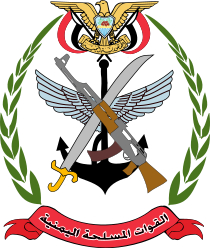
Back القوات المسلحة اليمنية Arabic ইয়েমেন প্রজাতন্ত্রের সামরিক বাহিনী Bengali/Bangla Jemenitische Streitkräfte German نیروهای مسلح یمن Persian Forces armées yéménites French הכוחות המזוינים של תימן HE Jemen hadereje Hungarian Angkatan Bersenjata Yaman ID Forze armate yemenite Italian イエメン軍 Japanese
You can help expand this article with text translated from the corresponding article in Arabic. (January 2024) Click [show] for important translation instructions.
|
| Yemeni Armed Forces | |
|---|---|
| الْقُوَّاتُ الْمُسَلَّحَةُ الْيَّمَّنِيَّة | |
 Emblem of the Armed Forces of Yemen | |
 Flag of the Armed Forces of Yemen | |
| Founded | 1920 |
| Current form | 1990 |
| Service branches | |
| Headquarters | |
| Website | |
| Leadership | |
| Commander-in-Chief |
|
| Prime Minister |
|
| Minister of Defense |
|
| Chief of Staff | Sagheer Hamoud Aziz (PLC) Abdul-Malik al-Houthi (SPC) |
| Personnel | |
| Military age | 18 |
| Available for military service | 12,002,529 [1], age 15–49 |
| Fit for military service | 8,875,554[1], age 15–49 |
| Reaching military age annually | 600,126[1] |
| Active personnel | 66,700 [2] |
| Reserve personnel | 0[1] |
| Expenditure | |
| Budget | $1.4 billion (2019)[3] |
| Percent of GDP | 8% |
| Industry | |
| Domestic suppliers | Yemen's military industry |
| Foreign suppliers | Pro-Yemeni government: |
| Related articles | |
| History | |
| Ranks | Military ranks of Yemen |
| Yemeni Armed Forces |
|---|
 |
| Leadership |
| Military services |
The Yemeni Armed Forces (Arabic: الْقُوَّاتُ الْمُسَلَّحَةُ الْيَّمَّنِيَّة, romanized: Al-Quwwat Al-Musallahah Al-Yamaniyah) are the military forces of the Republic of Yemen. They include the Yemeni Army (including the Republican Guard), Yemeni Navy (including the Marines) and the Yemeni Air Force (including the Air Defense Force). The capital of the country, Sana’a is where the military is headquartered. Per the constitution of Yemen, the President of Yemen serves as the commander-in-chief.
The supreme commander of the armed forces is disputed between Rashad al-Alimi, Chairman of the internationally recognized Presidential Leadership Council, and Mahdi al-Mashat, the chairman of the Supreme Political Council.
The number of military personnel in Yemen is relatively high; in sum, Yemen has the second largest military force on the Arabian Peninsula after Saudi Arabia. In 2012, total active troops were estimated as follows: army, 66,700; navy, 7,000; and air force, 5,000. In September 2007, the government announced the reinstatement of compulsory military service. Yemen's defense budget, which in 2006 represented approximately 40 percent of the total government budget, is expected to remain high for the near term, as the military draft takes effect and internal security threats continue to escalate.
Since the Yemen civil war, the armed forces have been divided between loyalists of the former president Ali Abdullah Saleh and pro-Yemeni government forces of president Abdrabbuh Mansour Hadi.
- ^ a b c d "2022 Yemen Military Strength". Archived from the original on 27 September 2019. Retrieved 11 October 2022.
- ^ Cite error: The named reference
military balance 2014was invoked but never defined (see the help page). - ^ "2020 Yemen Military Strength". www. Archived from the original on 27 September 2019. Retrieved 30 April 2019.
- ^ Yemen was Bulgaria's Biggest Arms Export Partner in 2010 - UN Archived 2011-12-03 at the Wayback Machine, Novinite, 9 August 2011
© MMXXIII Rich X Search. We shall prevail. All rights reserved. Rich X Search